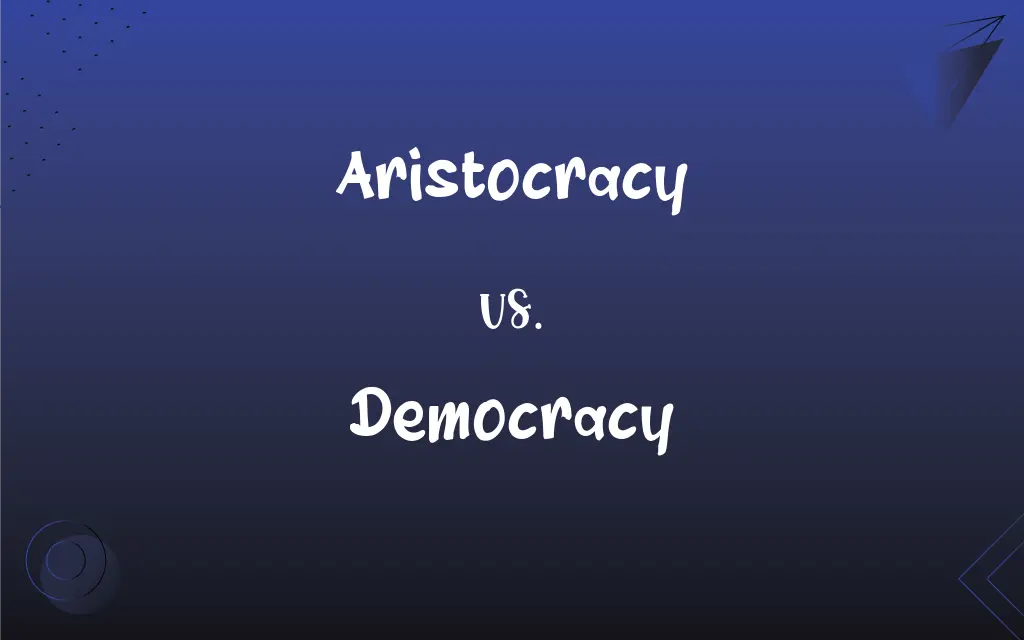Aristocracy vs. Democracy: What's the Difference?
Edited by Harlon Moss || By Janet White || Updated on October 7, 2023
Aristocracy is rule by the elite, often by birth, while democracy is governance by the people, typically through voting.

Key Differences
Aristocracy, as a form of governance, refers to the rule by a select group, often based on heredity or privilege. This system tends to concentrate power in the hands of a few, who are deemed superior by virtue of their noble birth or elevated social status. On the contrary, democracy emphasizes the role of the general populace in decision-making. The term stems from the Greek words 'demos,' meaning people, and 'kratos,' meaning power. As such, democracy is characterized by the principle of majority rule, often facilitated by regular elections.
In an aristocratic system, the leaders or representatives are not necessarily chosen by the masses, but rather ascend to power based on lineage or societal rank. The rights of the common people might be limited, with the aristocrats making decisions on their behalf. Democracy, in stark contrast, operates on inclusivity, ensuring that each citizen, regardless of their background, has a voice in the governance. This voice is typically exercised through voting in free and fair elections.
Historically, aristocracies were prevalent in many ancient civilizations, where royal or noble families held sway over large territories and their inhabitants. The aristocrats not only had political power but also controlled significant economic and social resources. Democracy, although ancient in origin with roots in city-states like Athens, gained widespread popularity in the modern era. Modern democracies ensure not only political participation but also uphold civil liberties and individual rights.
While the pure forms of both systems are distinct, the real-world presents blends. For instance, constitutional monarchies may exhibit characteristics of both aristocracy (with a royal family) and democracy (with elected bodies). Despite their differences, both forms aim at governance and order, albeit through varied mechanisms and principles.
Comparison Chart
Definition
Rule by a privileged minority or noble class.
Rule by the people, usually via voting.
ADVERTISEMENT
Basis of Power
Heredity, privilege, or elite status.
Consent of the governed, popular mandate.
Decision Making
Concentrated among the elite.
Distributed among the populace.
Representation
Typically none; based on lineage or rank.
Chosen by people, often via elections.
Historical Context
Common in ancient and medieval times.
Ancient roots but popularized in modern times.
Aristocracy and Democracy Definitions
Aristocracy
A form of government where power resides with a noble class.
The nation's aristocracy made decisions without public input.
ADVERTISEMENT
Democracy
A state governed by a democracy.
Democracy flourished after the revolution.
Aristocracy
Persons holding exceptional rank or privileges.
The artist was celebrated by the aristocracy.
Democracy
A system where the citizens exercise power by voting.
In a democracy, every vote counts.
Aristocracy
The highest class in certain societies.
She married into the aristocracy.
Democracy
Control of an organization by its members.
The club operated as a democracy.
Aristocracy
Governance by a privileged elite, often hereditary.
The aristocracy held lavish balls in their grand mansions.
Democracy
Government by the people, exercised either directly or through elected representatives.
Aristocracy
A social class regarded as superior due to education or birth.
The local aristocracy was invited to the gala.
Democracy
A political or social unit that has such a government.
Aristocracy
A hereditary ruling class; nobility.
Democracy
The common people, considered as the primary source of political power.
Aristocracy
Government by a ruling class.
Democracy
Majority rule.
Aristocracy
A state or country having this form of government.
Democracy
The principles of social equality and respect for the individual within a community.
Aristocracy
Government by the citizens deemed to be best qualified to lead.
Democracy
(uncountable) Rule by the people, especially as a form of government; either directly or through elected representatives (representative democracy).
Aristocracy
A state having such a government.
Democracy
A government under the direct or representative rule of the people of its jurisdiction.
Aristocracy
A group or class considered superior to others.
Democracy
(countable) A state with a democratic system of government.
Aristocracy
The nobility, or the hereditary ruling class.
Democracy
(uncountable) Belief in political freedom and equality; the "spirit of democracy".
Aristocracy
Government by such a class, or a state with such a government
Democracy
Government by the people; a form of government in which the supreme power is retained and directly exercised by the people.
Aristocracy
A class of people considered (not normally universally) superior to others
Democracy
Government by popular representation; a form of government in which the supreme power is retained by the people, but is indirectly exercised through a system of representation and delegated authority periodically renewed; a constitutional representative government; a republic.
Aristocracy
Government by the best citizens.
Democracy
Collectively, the people, regarded as the source of government.
Aristocracy
A ruling body composed of the best citizens.
In the SenateRight not our quest in this, I will protest themTo all the world, no aristocracy.
Democracy
The principles and policy of the Democratic party, so called.
Aristocracy
A form a government, in which the supreme power is vested in the principal persons of a state, or in a privileged order; an oligarchy.
The aristocracy of Venice hath admitted so many abuses, trough the degeneracy of the nobles, that the period of its duration seems approach.
Democracy
The political orientation of those who favor government by the people or by their elected representatives
Aristocracy
The nobles or chief persons in a state; a privileged class or patrician order; (in a popular use) those who are regarded as superior to the rest of the community, as in rank, fortune, or intellect.
Democracy
A political system in which the supreme power lies in a body of citizens who can elect people to represent them
Aristocracy
A privileged class holding hereditary titles
Democracy
The doctrine that the numerical majority of an organized group can make decisions binding on the whole group
Aristocracy
The most powerful members of a society
Democracy
A system of government by the whole population, usually through elected representatives.
The nation prided itself on its strong democracy.
FAQs
How do citizens participate in a democracy?
Typically through voting or civic engagement.
Are all aristocracies hereditary?
Often, but not always. Some are based on privilege or merit.
Is aristocracy limited to politics?
No, it can also refer to social classes with privileges.
Which countries are considered democracies?
Examples include the U.S., Canada, and many European nations.
Does aristocracy mean wealth?
Not necessarily, but the aristocratic class often holds wealth.
What is the primary characteristic of aristocracy?
Rule by a privileged or noble minority.
How do democracies ensure citizens' rights?
Often through constitutions or legal frameworks.
What is direct democracy?
A system where citizens directly vote on laws and policies.
How do democracies resolve disputes?
Through legal systems, debates, and sometimes referenda.
What ensures minority rights in democracies?
Legal frameworks and principles like checks and balances.
Can aristocracies be elected?
Typically no, as they're based on rank or lineage.
What's a cornerstone of democracy?
The principle of majority rule.
Can aristocracies change over time?
Yes, members can change, or they can evolve to other forms of governance.
Do all democracies function the same?
No, they can vary based on local culture, history, and governance structures.
What's a representative democracy?
Citizens elect representatives to make decisions on their behalf.
Do aristocracies value individual rights?
They might, but the focus is on the privileges of the elite.
How did aristocracies historically gain power?
Through lineage, conquests, or societal structures.
Can an aristocrat be a commoner?
Traditionally no, aristocrats are of noble or privileged rank.
Was ancient Greece aristocratic?
It had elements of both aristocracy and democracy.
Why is freedom of speech vital in democracies?
It ensures diverse opinions and holds leaders accountable.
About Author
Written by
Janet WhiteJanet White has been an esteemed writer and blogger for Difference Wiki. Holding a Master's degree in Science and Medical Journalism from the prestigious Boston University, she has consistently demonstrated her expertise and passion for her field. When she's not immersed in her work, Janet relishes her time exercising, delving into a good book, and cherishing moments with friends and family.
Edited by
Harlon MossHarlon is a seasoned quality moderator and accomplished content writer for Difference Wiki. An alumnus of the prestigious University of California, he earned his degree in Computer Science. Leveraging his academic background, Harlon brings a meticulous and informed perspective to his work, ensuring content accuracy and excellence.
































































